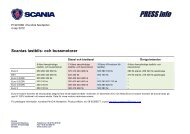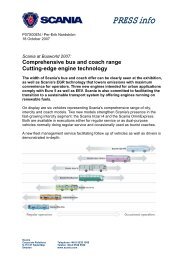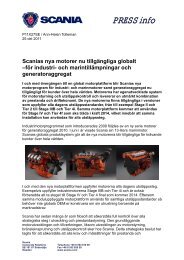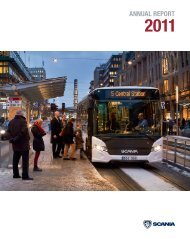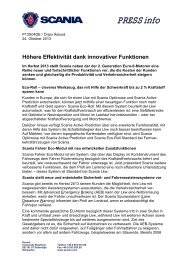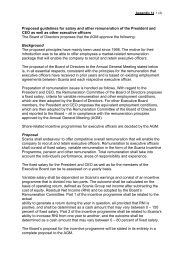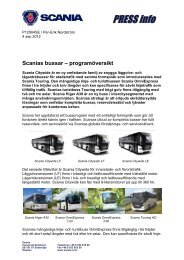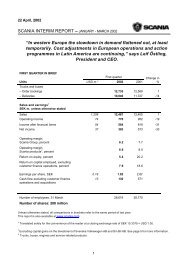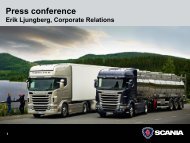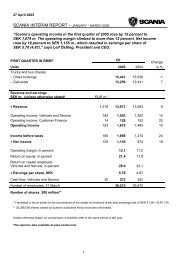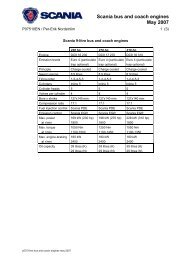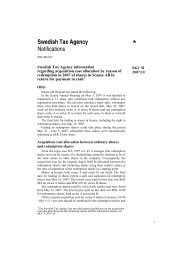Scania annual report 2003
Scania annual report 2003
Scania annual report 2003
You also want an ePaper? Increase the reach of your titles
YUMPU automatically turns print PDFs into web optimized ePapers that Google loves.
PRODUCTION<br />
Investments for increased capacity<br />
<strong>Scania</strong> develops and manufactures<br />
major heavy vehicle components –<br />
engines, cabs, gearboxes, axles and<br />
frames – under its own auspices.<br />
This gives <strong>Scania</strong> control of quality<br />
and cost levels in development and<br />
production.<br />
<strong>Scania</strong> has a global production system in<br />
which all its production units in the world<br />
are integrated. As a result, customers<br />
enjoy faster, more reliable deliveries, while<br />
<strong>Scania</strong> gains flexibility and greater<br />
efficiency.<br />
This is possible because today <strong>Scania</strong><br />
manufactures identical parts and components<br />
at all production units. Due to<br />
<strong>Scania</strong>’s global quality and environmental<br />
standards, as well as its shared production<br />
system, it is of no significance to the customer<br />
where <strong>Scania</strong> vehicles and components<br />
are manufactured. A <strong>Scania</strong> is<br />
always a <strong>Scania</strong>.<br />
During <strong>2003</strong> <strong>Scania</strong>’s production volume<br />
in Latin America rose, since local<br />
markets continued to recover as deliveries<br />
to other parts of the world rose. Today<br />
nearly half the company’s production of<br />
vehicles and components in Brazil and<br />
Argentina is exported to markets outside<br />
Latin America.<br />
Capacity increase in Zwolle<br />
At the same time, it is important to have<br />
enough assembly capacity near customers<br />
to be capable of responding quickly<br />
to increased demand. <strong>Scania</strong>’s investment<br />
at its assembly in Zwolle, the Netherlands<br />
increased the technical capacity of<br />
truck assembly lines there by more than<br />
50 percent. Together with concentration of<br />
component production to fewer locations,<br />
this will enable <strong>Scania</strong> to respond quickly<br />
to a rapid, strong growth in volume.<br />
Coordination of trucks and buses<br />
The restructuring of the bus and coach<br />
operations means that <strong>Scania</strong> is using the<br />
similarities between bus and truck chassis<br />
and benefits from existing synergies.<br />
Shared components is the basis for this<br />
coordination.<br />
To take advantage of these synergies<br />
between buses and trucks, during 2002<br />
<strong>Scania</strong> initiated closer coordination of development,<br />
procurement, manufacturing<br />
and marketing in Södertälje. This helped<br />
cut costs and improved competitiveness<br />
of <strong>Scania</strong>’s bus and coach operations. The<br />
restructuring of these operations will continue<br />
during 2004, when the wholly-owned<br />
bus bodybuilding company Omni will concentrate<br />
its bodybuilding operations in<br />
S upsk, Poland.<br />
Preparations for new products<br />
During <strong>2003</strong> <strong>Scania</strong> prepared its production<br />
units for the new truck range. Development<br />
lines for training and assembly<br />
verification were built in chassis assembly,<br />
where employees from Södertälje, Zwolle<br />
and Angers were trained alongside regular<br />
production. Similar development and training<br />
lines were built for engine,<br />
transmission and cab production.<br />
Flexibility<br />
Since the heavy truck market varies both<br />
seasonally and over longer economic<br />
cycles, flexibility is of great importance in<br />
production. The flexibility of the <strong>Scania</strong><br />
Production System (SPS), as well as the<br />
global production system, also makes it<br />
possible to respond more smoothly to<br />
both short- and long-term changes in<br />
volume.<br />
More efficient suppliers with the<br />
<strong>Scania</strong> Production System<br />
By sharing its experience, <strong>Scania</strong> helps suppliers<br />
to become more efficient in such fields as logistics,<br />
elimination of waste and quality improvements.<br />
This collaboration, which uses the working<br />
methods of the <strong>Scania</strong> Production System as<br />
a model, improves the competitiveness of both<br />
<strong>Scania</strong> and its suppliers.<br />
The Swedish-based company Swenox AB develops<br />
and manufactures complete exhaust and<br />
aftertreatment systems for the heavy vehicle industry<br />
in Europe. Competition is keen, and to<br />
increase its production, Swenox initiated an organised<br />
partnership with <strong>Scania</strong> in order to use<br />
<strong>Scania</strong>’s working methods and tools.<br />
Over the past year, the company has conducted<br />
training courses and formed pilot teams for<br />
improvement efforts.<br />
“During the spring of <strong>2003</strong>, we began the<br />
task of building up a new production line for<br />
<strong>Scania</strong> silencers. We received very valuable help<br />
from <strong>Scania</strong> in doing so,” explains Sten<br />
Fredholm, Managing Director of Swenox.<br />
To date, improvement efforts have provided a<br />
complete analysis of “losses” in the affected production<br />
segments. Changeover times in the company’s<br />
pilot areas have been reduced by half, and<br />
productivity has climbed on those production<br />
lines that work on the basis of the <strong>Scania</strong> Production<br />
System.<br />
“We are also seeing very good quality and<br />
delivery trends. In our most important product<br />
for <strong>Scania</strong>, the main silencer, we now have<br />
zero faults and 100 percent delivery precision,”<br />
Mr Fredholm continues.<br />
The target of continued improvement work<br />
at Swenox is that during 2004, all employees<br />
should belong to an improvement team.<br />
ANNUAL REPORT <strong>2003</strong> 30



